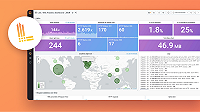Caution
Grafana Agent has reached End-of-Life (EOL) on November 1, 2025. Agent is no longer receiving vendor support and will no longer receive security or bug fixes. Current users of Agent Static mode, Agent Flow mode, and Agent Operator should proceed with migrating to Grafana Alloy. If you have already migrated to Alloy, no further action is required. Read more about why we recommend migrating to Grafana Alloy.
Important: This documentation is about an older version. It's relevant only to the release noted, many of the features and functions have been updated or replaced. Please view the current version.
Install Grafana Agent in static mode on macOS
You can install Grafana Agent in static mode on macOS with Homebrew.
Before you begin
Install Homebrew on your computer.
Note
The default prefix for Homebrew on Intel is
/usr/local. The default prefix for Homebrew on Apple Silicon is/opt/Homebrew. To verify the default prefix for Homebrew on your computer, open a terminal window and typebrew --prefix.
Install
To install Grafana Agent on macOS, run the following commands in a terminal window.
Update Homebrew:
brew updateInstall Grafana Agent:
brew install grafana-agent
Grafana Agent is installed by default at $(brew --prefix)/Cellar/grafana-agent/VERSION.
Upgrade
To upgrade Grafana Agent on macOS, run the following commands in a terminal window.
Upgrade Grafana Agent:
brew upgrade grafana-agentRestart Grafana Agent:
brew services restart grafana-agent
Uninstall
To uninstall Grafana Agent on macOS, run the following command in a terminal window:
brew uninstall grafana-agentConfigure
To create the Agent
config.ymlfile, open a terminal and run the following command:touch $(brew --prefix)/etc/grafana-agent/config.ymlEdit
$(brew --prefix)/etc/grafana-agent/config.ymland add the configuration blocks for your specific telemetry needs. Refer to Configure Grafana Agent for more information.
Note
To send your data to Grafana Cloud, set up Grafana Agent using the Grafana Cloud integration. Refer to how to install an integration and macOS integration.



